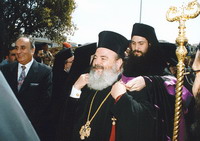Cancer hampers to end liver transplant surgery for Archbishop Christodoulos
Doctors in Miami stopped liver transplant surgery for the head of Greece's Orthodox Church, Archbishop Christodoulos, after his cancer was found to have spread to his abdominal cavity.

Lab analyses will show whether the metastasis was from the archibishop's liver cancer or colon cancer, said Greek transplant specialist Andreas Tzakis, the director of the University of Miami's organ transplant institute.
The latter would be much more treatable. Preliminary results suggest, however, that the liver cancer spread, Tzakis said.
"This is a very unusual complication. Personally, I was shocked by it," Tzakis said at a news conference at Jackson Memorial Hospital, where the surgery took place.
Liver cancer can spread to the bones, brain and lungs through blood, but a spread to the abdominal cavity is rare because of blood's circulation path, Tzakis said. This situation is unusual as well because the tumors had not burst, which is another way cancer can spread.
The transplant could not be completed because anti-rejection drugs that patients have to take after a transplant would fuel a tumor's growth.
Tzakis said the archbishop was off life support, alert and sitting up.
"This is very encouraging to me," Tzakis said. "So far, so good."
He will likely be out of the intensive care unit in a week or two, Tzakis said.
The 68-year-old archbishop was diagnosed with cancer in June after undergoing intestinal surgery, and had spent 40 days in a hospital in Athens. He waited 50 days for a compatible liver to become available.
A more definitive answer on the nature of the metastasized cancer was not immediately available because many hospital employees were off for the U.S. Columbus Day holiday. Lab results were expected by Tuesday or Wednesday.
Once they know the "nature of the beast," doctors can plan how to treat it, said Bach Ardalan, a University of Miami oncologist working on the case. But without that knowledge, Ardalan and Tzakis said they could not speak to treatment options for the archbishop or his prognosis. A future liver transplant operation is unlikely, however.
Elected church leader in 1998, Christodoulos often stirred controversy with politically tinged statements.
He was instrumental in attempts to improve ties with the Catholic Church; in 2001, Christodoulos received in Athens Pope John Paul II - the first pope to visit Greece in nearly 1,300 years - ignoring loud protests from Orthodox zealots. He followed up last year with a historic visit to the Vatican, where he and Pope Benedict XVI signed a joint declaration calling for inter-religious dialogue and restating opposition to abortion and euthanasia.
In Greece, politicians accused the archbishop of meddling in their affairs, angered by his vocal criticism of everything from homosexuality and globalization to Turkey's efforts to join the European Union and a recent government effort to tone down nationalism in school history books.
Subscribe to Pravda.Ru Telegram channel, Facebook, RSS!


